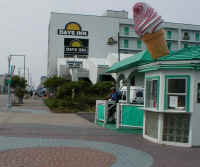City attorney's conflict of interest opinion on
Councilman
Linwood O. Branch III
City Councilman Linwood Branch, knowing he had at least an indirect, if not direct, business and financial relationship with Gold Key
Resorts, went to City Attorney Les Lilley three times since 1999 to get
legally
blessed to vote for the interests of Edmund C. Ruffin and Bruce L.
Thompson.
The most recent opinion, issued by Lilley last month, even got
Commonwealth Atty. Harvey L. Bryant III's seal of approval. And
in that last one,
Branch admitted to receiving income through Ruffin and Thompson
that he hadn't
acknowledged in the two previous opinions.
Ruffin and Thompson, a convicted federal felon and a convicted
federal misdemeanant, respectively, have been selected by the City Council to
develop a public/private partnership hotel at 31st Street, a controversial
development opposed by the majority of the public in last year's
referendum. But the will of the people was given no significance, since
somehow, they also voted, in the strangest of mixed signals, to elect to council
those committed to doing the opposite of what the people wanted at 31st Street.
The legal opinions are basically that, a
'get-out-of-jail-free-card' to do what you want since the state law is so ambiguous
that it probably isn't enforceable except when a public official is directly
caught receiving money to use his official position in a favorable way for the
gift-giver. And that action would be easier prosecuted as a bribe. Lilley's opinions basically acknowledge that to be true. He concludes each
with:
"The law does not, however, protect against all
appearances of improper influence. In that respect, the Act places the
burden on the individual officer to evaluate whether the facts presented
create an appearance of impropriety which is unacceptable or which could
affect the confidence of the public in the officer's ability to be
impartial."

Booth @ ice cream stand leased to Gold Key Resorts |
In his 1st statement of facts, dated
July 13, 1999, Branch
acknowledged: Gold Key (identifying Ruffin and
Thompson as partners
thereof) 'occasionally refers guests to Days Inn.' He did not
state whether he received any income from the deal and said he
sublets a small retail booth to Lar-Jac Corp., (a family related
business) which in turn leases to Gold Key.
He did not state whether he received any income from that arrangement.
(Unrelated, he said family members also owned property at 31st Street that
was scheduled to be condemned for the hotel project.) He wanted the
opinion to cover all bases. Lilley gave him
a clean bill of health on all issues to vote for the developers.
-
In his 2nd statement of facts, dated as recently as
April
24, 2001, Branch said he leases the booth area to
Lar-Jac, now on a 15-year
lease for a fixed sum; that Lar-Jac can sublet the property; and that
he has
no ownership interest in Lar-Jac; that Lar-Jac leases to Gold
Key, "a
time share business in which Edmund Ruffin and
Bruce Thompson are
partners..." and the rent is $7,000/yr. Branch
makes no mention
at this time of his room rental contract with Gold Key. Lilley again
gives him a clean bill of health to vote for Ruffin and
Thompson as 31st
partners of the city.
-
In his 3rd statement of facts, dated June 11,
2001, just
6-days after VNS first brought the issue of room rent referrals and
conflict of interest questions to Branch's attention at a Village Inn
breakfast meeting he had with another person: he advised Lilley
Gold
Key Resorts has 15 owners and Ruffin and
Thompson, ..."either
directly or indirectly, are majority stockholders...,"; that he has a
"year-to-year, nonexclusive written contract with Gold Key..."
whereby he "...reserves a certain number of rooms for ... Gold
Key..."clients and that referral fees collected by him under the
contract exceeds..."$10,000 a year." He makes no mention
of
the Lar-Jac Corp. lease or its relationship with Gold Key. Lilley was
much more cautious and circumspect in this opinion, but citing the law's ambiguity,
again
cleared Branch for future votes for Ruffin and
Thompson. Lilley did solicit
and get Commonwealth's Atty. Bryant's concurrence. But like,
all other opinions, he closed with his standard advice that the final decision
comes down to the public official himself.
When Branch got the June 11, 2001
opinion, he sent it and other information to VNS by
Priority Mail and by telephone agreed to meet and discuss the issues and
questions after VNS had read the documents. He refused to keep his
word,
declining numerous attempts to talk with him. Even after VNS
hand-delivered a set of questions for him to review in advance, he refused. VNS therefore had no choice, but to
interview Branch's empty
chair.
Main story Empty chair interview
Home
